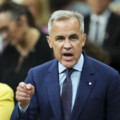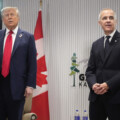The federal government’s proposed emissions cap for Canada’s oil and gas sector is intensifying debate as it targets a 35 percent reduction in greenhouse gas emissions from 2019 levels, by 2030.
Environment Minister Steven Guilbeault unveiled the draft regulations this afternoon, saying the sector must reduce emissions to remain competitive in a world moving toward low-carbon energy.
“I think most Canadians—even those that aren’t my biggest fans—would agree that it’s not OK for a sector to not be doing its share, and that’s mostly what this regulation is about,” Guilbeault told media.
“No other major gas producer is doing what we’re doing,” said Guilbeault, referencing the United States, the United Kingdom, Norway, and the Gulf States. “We’re the only large oil and gas producer in the world to do this.”
In a long-form DeepDive piece for The Hub, ARC Energy Research Institute energy analyst Peter Tertzakian argues Canada’s energy industry needs a “time-out” on new carbon policies to assess and simplify the current regulatory landscape.
As Ottawa rolls out new climate directives ahead of COP29 next week, Tertzakian argues the existing web of policies should be reviewed before adding more, which he warns could undermine Canada’s economic and environmental goals.
“Applying Occam’s Razor to the complex web of existing policies, carbon markets, and climate-related regulations could greatly benefit our economy, strengthen energy security, and protect the environment,” he writes. “Ignoring this step risks achieving the opposite effects.”
Tertzakian points to global signs that current approaches are failing. As the Paris Agreement marks its 10th anniversary next year, emissions continue to rise, with only a few countries on track to meet their targets.
“Discouraging investment is yet another consequence of a maze of incongruent and often incomprehensible policies.” Tertzakian warns that despite stringent policies, global emissions continue to rise. He argues that new regulations could potentially impose higher economic burdens on one sector without making meaningful emissions cuts.
Citing Canada’s proposed cap as an example, Tertzakian questions whether more restrictions are necessary. Emissions from natural gas production and conventional oil processing have already dropped 17 percent and 27 percent, respectively, since 2013, he says. Tertzakian suggests these reductions could continue under existing regulations, while additional caps could hinder productivity and add regulatory confusion.
In contrast, Pembina oil and gas policy analyst Janetta McKenzie argues that only a strict emissions cap will push Canada’s oil and gas sector to meaningfully decarbonize.
“Canada’s energy companies are ‘awash in cash and hungry,’” McKenzie notes, referring to recent mergers and record dividends. “What the industry isn’t doing is spending a significant amount on decarbonizing its operations. Only an emissions cap will obligate companies to do so.” McKenzie believes the cap is crucial to ensure the sector contributes to national climate goals, describing it as a “realistic and reasonable” step in Canada’s journey to net zero by 2050.
The conflict is intensifying as Alberta launches a $7-million “scrap the cap” campaign, arguing that the cap could lead to job losses and hinder Alberta’s economic growth. Premier Danielle Smith contends that the policy will limit Alberta’s development prospects.
For Guilbeault, the cap is essential for both environmental progress and competitiveness in a low-carbon world. He insists that the cap can be achieved without reducing oil and gas production, citing federal modelling that projects a 16 percent production increase by 2032, even with the cap.
“In a carbon-constrained world, people who will still be demanding oil will be demanding low-emitting oil,” Guilbeault said, adding that the cap will help Canada’s oil sector remain viable as nations seek greener options. The cap, he says, will encourage alignment with global shifts toward cleaner energy.
The debate underscores the tension between economic growth and climate goals in Canada’s energy sector.
ChatGPT assisted in the creation of this article.
Editor’s note: Some quotes and statements were revised for accuracy.









